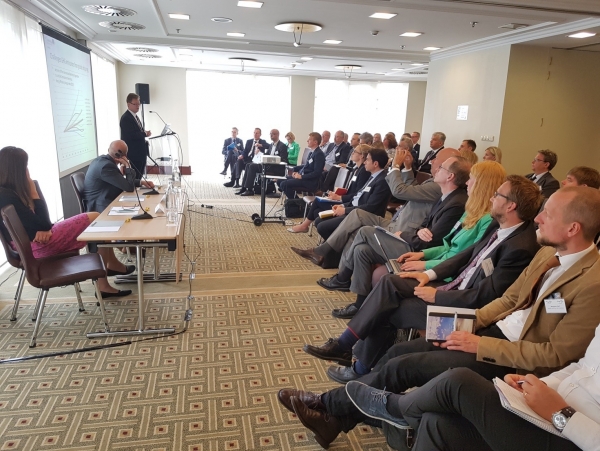Representatives from the European Commission, the European Parliament, the maritime industry and maritime Flagship Projects under the EU Strategy for the Baltic Sea Region (EUSBSR) convened in Brussels on 30 May to discuss the potentials and future priorities for maritime safety and security and clean shipping in the Baltic Sea Region.
Cooperation
Cooperation is needed if the aim of making the Baltic Sea Region a global frontrunner in terms of clean and safe shipping is to be achieved. Already now, the region has strong competences in the maritime field, but cross-sectorial cooperation is needed to strengthen its position. This was highlighted by all panellists as being just as important as transnational cooperation.
Enforcement in focus
In a region under great pressure from environmental regulation, it is necessary to focus on harmonized enforcement of existing regulations rather than on the adoption of new rules. This was stressed in a panel debate between four Members of the European Parliament from countries around the Baltic Sea. Generally, also the representatives from the industry and the Commission as well as several of the Flagship Projects present focused on greener shipping and better enforcement of existing environmental regulations.
Improving maritime education and training to meet the demands of tomorrow
Another important challenge which was stressed by several speakers during the event was the need to maintain and develop high-quality maritime education and training institutions around the Baltic Sea. The competitiveness of the region's global maritime industry depends on the ability to supply a highly skilled maritime workforce. A workforce capable of coping with a future where digital solutions and autonomy are likely to play a more prominent role than is the case today. E-Navigation and digital solutions are already high on the region's agenda and they have a great potential for securing increased efficiency and safety in the maritime industry. These projects may also help minimise the environmental impact of shipping on the delicate ecosystem of the Baltic Sea.
Flagship Projects
During the seminar 12 Flagship Projects presented their work and their concrete proposals on how to develop a safer, securer and cleaner future for the Baltic Sea Region to both industry and political stakeholders. The presentations from the Flagship Projects can be found here.
The Brussels seminar
The seminar was organised by the Danish Maritime Authority and the Finnish Transport Safety Agency (Trafi), which are the Policy Area Coordinators for the Policy Area on Maritime Safety and Security (PA Safe) and the Policy Area on Clean Shipping (PA Ship) under the EUSBSR.
|
Policy Area Safe The primary aim of the policy area is for the Baltic Sea Region to become a leading region in maritime safety and security, thereby i.a. contributing to reducing the risk of maritime accidents in the Baltic. This aim is pursued through implementation of actions by means of a project-based policy dialogue. This dialogue helps to identify gaps in the cooperation, identify projects and encourage project makers to fill those. For more information see http://pa-safe.dma.dk |
Policy Area Ship The overall goal of the Policy Area on Clean Shipping (PA Ship) is for the Baltic Sea Region “to become a model region for clean shipping”. PA Ship aims to reach this goal by focusing on achieving 3 specific actions. 1) To create an infrastructure for alternative fuels in the Baltic Sea Region, 2) To support measures reducing emissions from ships, and 3) To develop shore-side facilities to foster clean shipping measures. For more information see http://pa-ship.dma.dk |
Spotlight blog series introduces the concrete work done by the Policy Areas and Horizontal Actions of the EU Strategy for the Baltic Sea Region.




